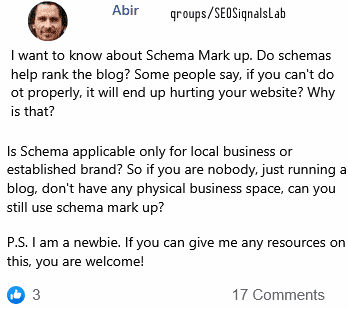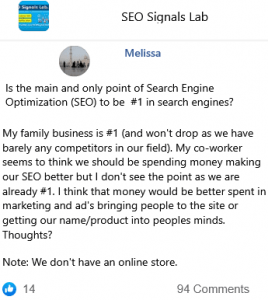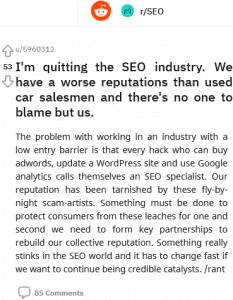How to do the SEO audit? I am a beginner SEO.
Hi guys,
I am a beginner SEO. I have got the customer for whom I write content. He wants me to perform the SEO audit that would cover both technical points and User Experience (UX) ones.
I am reading a lot of articles about the SEO audits online.
COuld you please recommend any articles or checklists which you find useful?
44 💬🗨
📰👈
There is no standard operating procedure when it comes to audits IMO. However, there's a lot of common inspection that's relevant to any site in any niche. Here's a general outline:
• Identify competitors
This is a lot more than just coming up with a short list of other websites that are similar to a client. The first step in identifying competitors is to know what kind of competition you're looking for.
There's whole domain competitors, there's specific keyword competitors, and there's anticipated future competitors, among others. So before I get started I make sure I have the website that I want to find competitors for but also two to three primary keywords that a website wants to rank for. These keywords could be ranked for already, or they could be future goals.
2. Profile competitors
The next step is to build data for each competitor. That's going to involve backlink data, organic keyword position data, and I like to add in a lot of content performance related data. For example, an Ahrefs top content report for a domain is always good as is an SEM rush top pages report. Personally, I make use of a lot of custom scripts to consolidate duplicate keywords, duplicate URLs, and etc across all of that data and combine it into one master reference file for future use. It allows for easy competitive comparison as well as reference for creating content schedules.
3. Related keywords and undervalued opportunities
Next step should be to identify lucrative keywords to target. This should be a much deeper look than just specific keywords, but that's a good jumping off point. again, I like to take all the data from step two and run through a few custom scripts that value keywords based off of monthly volume, average Cost Per Click (CPC), total results, trends, and even CPC competition. I generally try to filter out for branded keywords and irrelevant stuff.
With that calculated value, I then rank all keywords in descending order of those that I believe would be most valuable for a website to consider targeting. Then I take the data collected from previous steps and cross reference with the new keyword list to build a new weighted list of content ideas and related keywords. Most of this is automated up to this point, but the general take away is that you want to find keywords of medium to low difficulty, with decent search volume and CPC values, that are related to interests within a niche and or vertical.
All the referencing of competitors pages and content and backlinks are basically used to just build a model that can come up with those relevancy numbers automatically. I don't really know how one would begin to do that manually, as it might take an eon. Imo, is pretty essential to a full-fledged site audit though.
4. Identify outreach targets
Outreach is not really part of a side audit, but it's pretty easy to build a list of potential related websites that a client could reach out to to promote their content. I generally take the top 10 competitors found from earlier steps and plug into AH refs, if I haven't already, to get all their backlinks. I then filter those for in content, do follow links within a range of Ahrefs Domain Rating (DR). Typically, I filter between 20 and 50 but depending on available data that might get looser or tighter or shifted. This results in a list of websites that are mildly filtered, but still need some manual qualification. There's going to be a considerable amount of junk here but it's still a great jumping off point.
5. Technical analysis
No SEO audit would be complete without a technical audit to find site errors and etc. in my opinion, 90% of this should be done with automated tools of which there are no shortage. I also think that being able to interpret those results manually is an essential step as well. There's a lot of shit that pops up in those results that are absolutely irrelevant or absolutely shouldn't be prioritized IMO. One of the most essential things to look for ensuring proper schema markup is present. If you're doing local, you need to make sure Name, Address & Phone Number (NAP) is there and all the businesses contact info is identical across there misc directory profiles.
6. Website organization
Good SEO is good organization. Auditing a websites existing taxonomic structure is an essential step before launching an SEO campaign. there should be clear hierarchy for categories, service pages, location pages, etc. This step involves different consideration for different websites. For example, local and international is a really big difference. A blog versus an e-commerce store is a really big difference.
7. Audit existing content
If website already has a lot of blog posts, articles, videos, etc then you need to take a look at that. Look for content that is thin, duplicate, doesn't make sense, isn't related, etc that you can prune away and or combine for better performance. In most cases, I find that a small percentage of a websites content ranks well for any keywords. Going through things with a hatchet can help clear up any confusion on Google's behalf about which pages should rank for which keywords. A lot of websites that I've worked on over the years start off, when I get a hold of them anyway, with a lot of extra content that was just haphazardly created because they read a blog post somewhere that said "create content and your website will rank." 1200 blog post later, there's a lot of random shit they can get in the way imo.
8. The unknown
Every website has the potential to require steps that you haven't even imagined before. A lot of times that involves retheening a WordPress site, maybe getting rid of a bunch of junk plugins, maybe migrating to a faster more performant web host, maybe reaching out to a couple of old backlinks and letting them know about new content. There's always some stuff that's going to fall outside of SOP and has to be figured out on the go.
📰👈
Eklundz
The golden rule follows the following 4 steps.
1: Find out which keywords you should be ranking for and look how you are currently ranking on said keywords.
2: Look to see if you have any content that answers the questions behind those keywords.
3: Look to see if there are any technical issues that are harming your sites chances to rank for said keywords.
4: Gain external links to your various pages that are answering the questions behind the keywords you want to be ranking for.
This is the most effective method.
Some tips:
• Don't start by looking at external links.
• Don't start by looking for technical issues
Search Engine Optimization (SEO) is all about figuring out what keywords you want to be ranking for and then making sure you have content that answers the questions behind those keywords. Technical SEO and External links are more of hygiene factors that can't really be worked on before you've established what you should be ranking for and how you're performing at the moment.
andzon
I am a huge fan of Moz's Whiteboard Friday so check it out every Friday, those info could be very useful and updated. Too bad Rand Fishkin is not part of it anymore.
Here are my two cents from creating two successful websites purely from SEO and got my company acquired.
– Start with Google search console, make sure you have access to it of course. Google will let you know if the website has any errors, or penalty that need to solve. Check it frequently to know where what your content is ranking in terms of keywords. So it gives you an idea of what keywords do well for your content and you can further create more of similar ones.
– Internal optimization, whether is meta tag title and description, robots.txt, 301 redirections for duplicated pages, sitemap, the structure of your subfolders (domain), hreflang, redirections for HTTP, www. or without www. to your main domain of https.
– Best SEO tool that I came across for auditing is SEO Screaming Frog, is expensive but useful if you are using it frequently.
Just let me know if you have any questions
Moz's Whiteboard Friday
You should be wary of those. Many of Rand's white boards have been disputed with tested, repeated results over the past few years. Stuff gets thrown up on those white boards they don't bother to test or have a decent grasp of as concept and ranking signals. There are a number of tests over at seointelligenceagency.com with results explaining issues with particular white boards. I've posted in the past several times with examples, test numbers, etc. Just FYI.
GainRank
You can try our 100% free software/services on GainRank.com. We offer many services, but a few of the most popular include:
• Rank Tracker – Our software tracks your keywords across the web.
• Site Audit – Enter your domain and our software will analyze your website's friendliness across multiple areas.
• Site Profiler – All of the tracking tools are in one place using GainRank's software! No need for multiple accounts across websites. Just enter your website and we will generate a report for you!
We are working on more services as well. If there is anything you don't see, but are in need of, please let us know!
steffanlv
There's some really solid advice here (and some not so solid advice *cough* Moz *cough*). I learned Search Engine Optimization (SEO) through emulating case studies and just trying to get sites to rank in order to turn a profit. Most of my experience came from sites like blackhatworld.com and through access to people at Google whom I had direct access to due to the quantity of clients' ad spend with Google. That type of access is virtually impossible today.
A lot of quality auditing software/services out there. I have accounts with Ahrefs , SEO PowerSuite, CORA, and others. My audits typically has data from all of them. Pulling audits from each and using what you need is what I would recommend.
Several here appear to be offering free audits. Go ahead and grab them and use them to help you learn the type of content and analytics that are typically in audits. I'm a huge proponent of CORA because it has hands down THE best auditing available. CORA gets data from sites that rank top 10 in Google for your keyword phrases and gives you a detailed list of what you need to do and which ranking factors to focus on in order to get your website in the top 10 in Google too. There are a number of reputable SEO sites out there that will also offer you free auditing reports. Reach out to them and request audits too.
📰👈
An SEO-er Did an SEO Audit for a Prospect, Assuming It Would Be a Client. But the Reality Told…
37 SEO Best Practices Involving Social Media, Silo, SEO Plugins, Schema, Video Submission, Keyword Research, SEO Audit
Advanced SEO Audit Elements: Schema Markups, Redirects, and Blackhat Elements!














